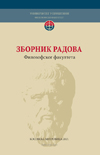“Reading Sucks Ass:” The (Re)Shaping of South Park’s Humor Through Literary References
Abstract
The paper examines the complex relationship between a lauded American animated sitcom South Park on one side, and literature, especially satire, on the other. Upon asserting the bond between literature and popular culture, numerous references present it the show are pointed out, namely the stance the authors take on literature and the act of reading, the kind f humor exhibited, and topicality. Finally, using the writing of Mikhail Bakhtin, South Park itself is treated as literature as its brand of laughter is a continuation of an age-old literary tradition of laughter. The conclusion muses on this as it is revealed that South Park owes much of its popularity to the literary aspect of its humor.
References
Arp, R. (2007). “Dude, Listen to Reason! Logic Lessons Inside and Outside South Park.” In South Park and Philosophy: You Know, I Learned Something Today, Ed. Robert Arp and Kevin S. Decker (pp. 41–52). [pdf] Oxford: Blackwell.
Bahtin, M. (1978). Stvaralaštvo Fransoa Rablea i narodna kultura srednjeg veka i renesanse. Trans. from Russian by Ivan Šop i Tihomir Vučković. Beograd: Nolit.
Bahtin, M. (2000). Problemi poetike Dostojevskog. Trans. from Russian by Milica Nikolić. Beograd: Zepter Book World.
Bahtin, M. (2013). Estetika jezičkog stvaralaštva. Trans. from Russian by Mirjana Grbić. Sremski Karlovci; Novi Sad: Izdavačka knjižarnica Zorana Stojanovića.
Certeau, M. de. (1988). The Practice of Everyday Life. Trans. Steven Rendall. [pdf] Berkeley; Los Angeles; London: University of California Press.
Danesi, M. (2009). X-Rated!: The Power of Mythic Symbolism in Popular Culture. [pdf] New York: Palgrave Macmillan.
Ewing, J. (2013). “Of Marx and Mantequilla: Labor and Immigration in ‘The Last of the Meheecans’,” In The Ultimate South Park and Philosophy: Respect my Philosophah!, Ed. Rober Arp and Kevin S. Decker (pp.143-153). [pdf] Chichester: Wiley-Blackwell.
Fiske, J. (1990). Reading the Popular. [pdf] London; New York: Routledge.
Halsall, A. (2008). “’Bigger Longer & Uncut:’ South Park and the Carnivalesque,” In Taking South Park Seriously, Ed. Jeffrey Andrew Weinstock (pp. 23-39). [pdf] Albany: State University of New York.
Hartley, J. & Fiske, J. (2003). Reading Television. London: Routledge.
Johnson-Woods, T. (2007). Blame Canada: South Park and Popular Culture. New York: Continuum.
Tueth, M. (2005). “Breaking and Entering: Transgressive Comedy on Television,” In The sitcom reader: America viewed and skewed, Ed. Mary Dalton and Laura Linder (pp. 25–34). [pdf] Albany: State University of New York P.
Weinstock, J. A. (2008). “’Simpsons Did It:’ South Park as Differential Signifier,” In Taking South Park Seriously, Ed. Jeffrey Andrew Weinstock (pp. 79-99). [pdf] Albany: State University of New York P.
The details about the publication policy, including copyright and licensing, are available at:

